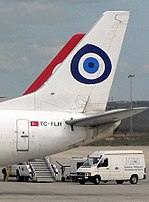This is an old revision of this page, as edited by Verycuriousboy (talk | contribs) at 07:56, 18 August 2011 (→See also: 'See Also' links of wiki). The present address (URL) is a permanent link to this revision, which may differ significantly from the current revision.
Revision as of 07:56, 18 August 2011 by Verycuriousboy (talk | contribs) (→See also: 'See Also' links of wiki)(diff) ← Previous revision | Latest revision (diff) | Newer revision → (diff)| This article does not cite any sources. Please help improve this article by adding citations to reliable sources. Unsourced material may be challenged and removed. Find sources: "Nazar" amulet – news · newspapers · books · scholar · JSTOR (January 2009) (Learn how and when to remove this message) |


A nazar, lucky eye or evil eye stone (Template:Lang-tr) is an amulet that is meant to protect against the evil eye ("evil eye", from nazar and "amulet" from boncuğu). It is most common in Afghanistan, Turkey, Armenia, Iran and Greece. In Turkey it is ubiquitous in offices and homes, in jewellery, including for babies, on vehicles, doors, horses and even cell phones.
It is usually seen in the form of a flattened bead or hanging ornament, made by hand from coloured glass, and used as a necklace, or attached to bracelets or anklets. Typically it is composed of concentric circles or droplet shapes – from inside out: dark blue (or black), light blue, white and black (occasionally a yellow/gold edge circle) and is sometimes referred to as the blue eye.
Other uses
The same image was used as a symbol on the tailfins of aeroplanes belonging to the private Turkish airline Fly Air.
It is used in the logo for CryEngine 3, a game engine designed by Crytek, a video game company founded by three Turkish brothers.
See also
References
- Langenscheidt's Pocket Turkish Dictionary.Langensheidt, 1992, p. 638.
- Lonely Planet Middle East.Lonely Planet; 6 edition, 2009, p. 559.
- Lonely Planet Middle East.Lonely Planet; 6 edition, 2009, p. 559.
This culture-related article is a stub. You can help Misplaced Pages by expanding it. |
This Turkey-related article is a stub. You can help Misplaced Pages by expanding it. |